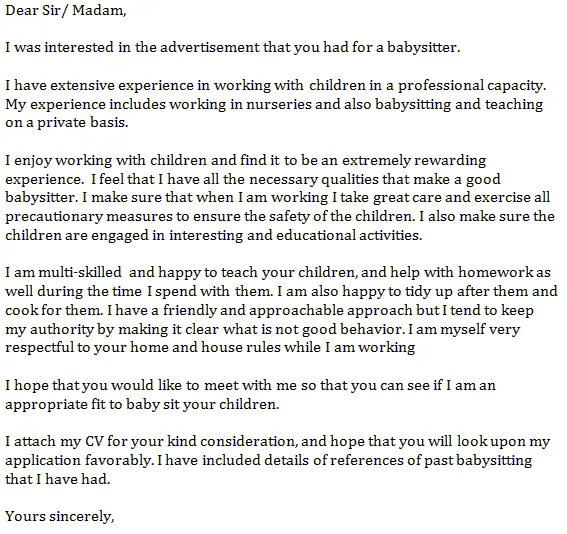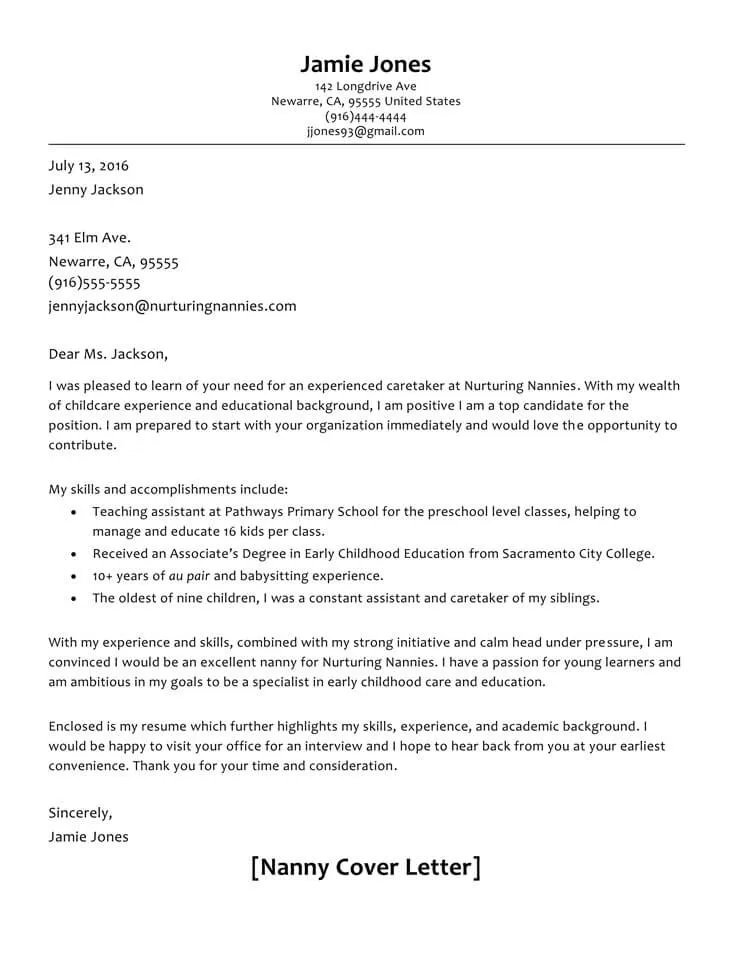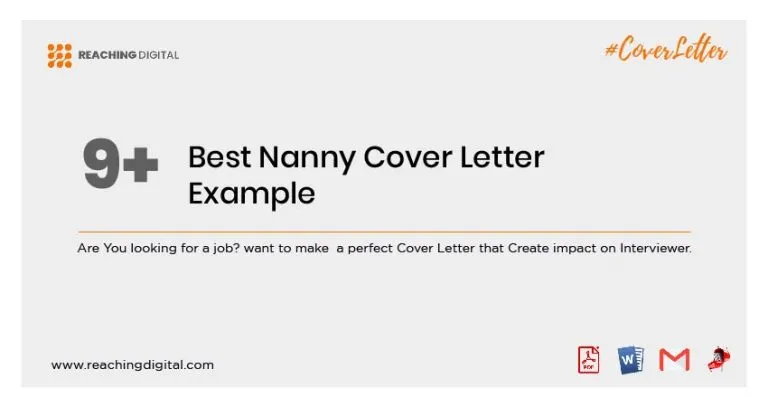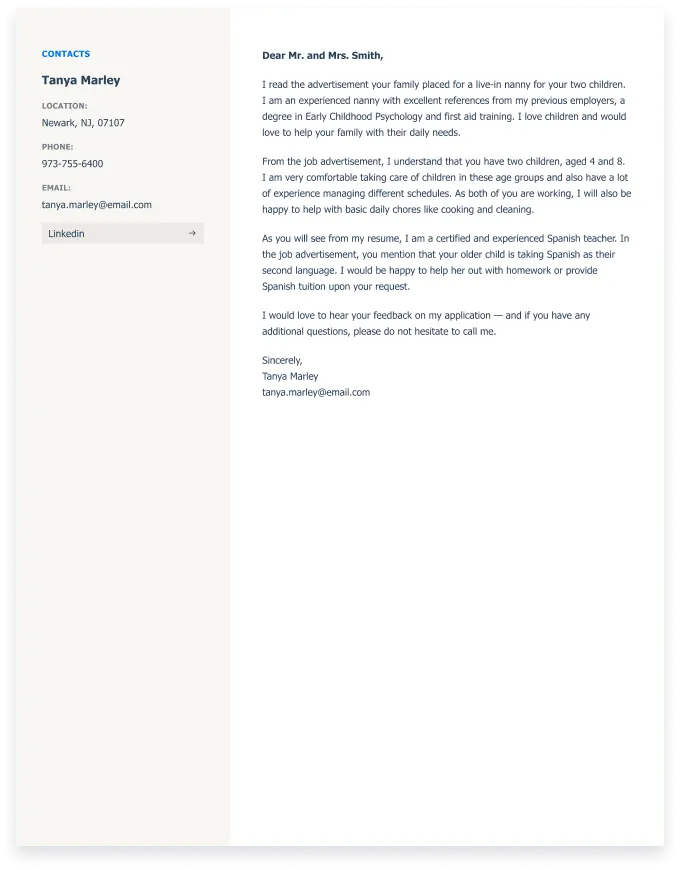Understanding the Importance of a Babysitter Cover Letter
A babysitter cover letter is more than just a formality; it’s your first impression and an opportunity to showcase why you’re the perfect fit for the job. It allows you to go beyond the basic information on your resume and highlight your personality, skills, and experience in a way that truly resonates with potential employers. A well-crafted cover letter demonstrates your professionalism, attention to detail, and genuine interest in the position, significantly increasing your chances of getting hired. It is your chance to demonstrate that you understand what parents are looking for in a caregiver for their children. Therefore, treat your cover letter as a vital tool in your job search arsenal.
Highlighting Relevant Experience
Your cover letter should clearly and concisely outline your experience. Instead of simply listing past jobs, provide specific examples of how you’ve cared for children in the past. This includes details on the age groups you’ve worked with, the types of activities you’ve planned, and any special needs you’ve accommodated. Did you supervise a group of children at a summer camp? Did you provide after-school care for a family? Did you assist with homework or prepare meals? Quantify your experience whenever possible. For example, instead of saying ‘I watched children’, state ‘I cared for two children, ages 5 and 7, for three afternoons a week’. This specificity builds credibility and helps parents envision you caring for their children.
Showcasing Childcare Skills

Parents want to know that their children will be safe and engaged under your care. Therefore, your cover letter should explicitly mention the childcare skills you possess. This includes things like first aid and CPR certification, experience with diaper changing, meal preparation, and bedtime routines. If you have experience with specific activities, such as arts and crafts, outdoor play, or educational games, be sure to include those as well. Also, address any special needs you have experience with, such as allergies, medication administration, or behavioral challenges. Be as specific as possible, mentioning what you’ve done, the age ranges involved, and any positive outcomes or feedback received from past experiences. Emphasize your ability to create a positive and nurturing environment for children, as well as your commitment to their safety and well-being.
Mentioning Soft Skills and Personality
Beyond technical skills, parents are looking for a caregiver who is patient, reliable, and genuinely enjoys spending time with children. Use your cover letter to highlight your soft skills and personality traits. Are you creative, energetic, or calm? Are you a good communicator? Do you have a knack for storytelling or a talent for organizing fun activities? Provide examples of how these qualities have benefited you in past childcare roles. Mention your reliability and punctuality and that you are trustworthy. A brief anecdote about a time you handled a difficult situation with a child can demonstrate your problem-solving skills and ability to remain composed under pressure. Show that you understand the importance of building a positive relationship with the children in your care and that you value their happiness and well-being.
Tailoring the Letter to the Specific Job
Avoid sending a generic cover letter. Tailor each letter to the specific job you’re applying for. Carefully read the job description and identify the skills, experience, and qualities the employer is seeking. In your cover letter, address each of these requirements and demonstrate how you meet them. If the job description mentions a specific age group or activity preference, make sure to highlight your relevant experience. Research the family or employer, if possible. This might involve checking their social media, or looking at reviews if available. This allows you to add a personal touch and demonstrate that you understand their needs and values. Personalizing your cover letter shows that you are genuinely interested in the position and have taken the time to understand what the employer is looking for.
Proofreading and Editing for Perfection

Typos and grammatical errors can quickly undermine your credibility. Proofread your cover letter carefully before sending it. Check for spelling, punctuation, and grammatical errors. Use a grammar checker, but don’t rely on it entirely; have a friend or family member review your letter as well. Ensure that your cover letter is well-organized, easy to read, and free of any confusing or ambiguous language. Pay attention to the tone of your letter, making sure it’s professional, friendly, and enthusiastic. Before submitting your application, double-check all contact information to prevent any miscommunication. A polished and error-free cover letter demonstrates your attention to detail and professionalism, making a positive first impression and increasing your chances of securing an interview.
Creating a Compelling Opening
The opening of your cover letter is critical because it grabs the reader’s attention and sets the tone for the rest of the document. Avoid generic openings such as ‘I am writing to express my interest.’ Instead, start with a compelling statement that highlights your most relevant skills and experience. You could mention a specific accomplishment, a unique skill, or your enthusiasm for the position. For example, ‘With five years of experience caring for children aged 2-8, I am confident in my ability to provide a safe, nurturing, and engaging environment for your children.’ Or, ‘My passion for childcare and extensive experience in creating educational and fun activities make me a strong candidate for your babysitter position.’ Immediately convey your key qualifications and why you’re a good fit, piquing the reader’s interest right from the start.
Demonstrating Enthusiasm and Passion
Employers seek caregivers who genuinely enjoy working with children. Your cover letter should radiate enthusiasm and passion for childcare. Share what you love about working with children and why you find it rewarding. Mention any specific aspects of childcare that you’re particularly passionate about, such as arts and crafts, outdoor play, or educational activities. This helps establish a genuine connection with the reader and shows that you are more than just a job seeker; you are a caring and enthusiastic individual. Your excitement will make a positive impression and set you apart from other applicants. Parents want to feel confident that the person caring for their children is not only capable but also genuinely invested in their happiness and well-being.
Highlighting Your Availability

Be clear about your availability. Parents need to know whether your schedule aligns with their needs. State the days and times you are available to work. If your schedule is flexible, mention your willingness to accommodate their needs. If you are seeking part-time, full-time, or occasional work, specify it in your cover letter. Providing concrete details about your availability saves the reader time and indicates that you are organized and prepared. Be realistic and truthful about your availability. If you are available for fewer hours than requested, make that clear upfront. Clear and precise information about your availability can significantly increase your chances of getting an interview.
Ending with a Strong Call to Action
The ending of your cover letter is your final opportunity to make a strong impression and prompt the reader to take action. Close with a call to action that encourages them to contact you for an interview. Thank them for their time and consideration. Express your eagerness to discuss the position further. You could add a sentence such as, ‘I am available for an interview at your earliest convenience’ or ‘I look forward to hearing from you soon.’ Providing a direct call to action shows your enthusiasm and professionalism and clearly outlines the next step you would like the employer to take. Restate your contact information so that it is easy for them to reach you.
Providing Contact Information
Make sure your contact information is easy to find and includes all necessary details. Include your full name, phone number, and email address. Double-check that your email address is professional. You might want to have a dedicated email for job applications. If you have a professional online profile, such as a LinkedIn profile, or a babysitting profile, include a link. Ensure your phone number is correct and that your voicemail is set up to accept messages. Your contact information should be accurate and up-to-date. Ensure you are easily reachable so the employer can quickly contact you to schedule an interview. A lack of correct information can lead to missed opportunities, making it essential to double-check it before sending your cover letter.
